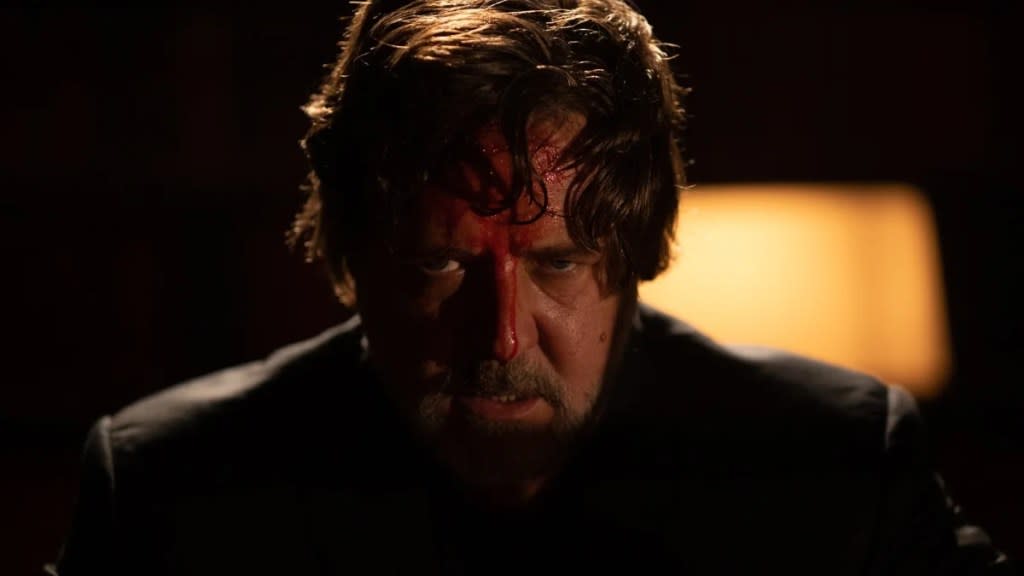‘The Exorcism’ Review: The Power of Crowe Compels You

Joshua John Miller’s “The Exorcism” is not a funny movie. If anything, it’s deeply disturbing. But there’s a pretty good joke at the end of the credits if you wait around long enough. Although almost every movie claims in the fine print that “any similarity to actual persons, living or dead, is purely coincidental,” there’s no way in hell they expect us to actually believe it this time. It’s gotta be a gag.
“The Exorcism” tells the story of Anthony Miller, an alcoholic and a drug addict in recovery, who threw away his lucrative and respected career as a motion picture actor. When the star of a remake of “The Exorcist,” called “The Georgetown Project,” dies under mysterious circumstances, Miller accepts the job but falls retreats into his old vices, overwhelmed by horrifying childhood memories and, possibly, a real supernatural force. Only his teenaged child, a queer screenwriter named Lee (Ryan Simpkins, “Fear Street”), seems to care that he’s deteriorating. Can Anthony Miller truly be saved before he kills himself… or Lee?
This film was directed and co-written by Joshua John Miller, a former child actor who co-starred in the 1980s cult classics “Near Dark” and “Teen Witch.” Miller’s father was Jason Miller, the Pulitzer Prize-winning, Tony Award-winning, Oscar-nominated star of “The Exorcist.” After the slasher comedy “The Final Girls,” this marks the second screenplay Miller has co-written with M.A. Fortin about a teenager with a horror-movie actor for a parent, who finds themselves trapped inside of a horror movie for real.
If that’s a coincidence it’s the biggest coincidence of all time.
The thing is, both “The Final Girls” and “The Exorcism” are exceptionally interesting. “The Final Girls” is a meta-comedy version of this story, a whimsical genre subversion with a surprisingly big heart. “The Exorcism” is the ominous, tortured version of the same tale. Individually they are intriguing genre exercises. Taken as a whole they form a riveting and complicated dyad.
Russell Crowe gained much of his early notoriety from displays of on-screen power in films like “Romper Stomper,” “L.A. Confidential” and “Gladiator.” But he’s never more devastating than when he’s meek. Anthony Miller is a sad, wounded man and taking on the role of a Catholic priest is especially harrowing for him, because he was the victim of sexual violence as an altar boy. His director, Peter (Adam Goldberg), has no qualms about stoking Anthony’s substance abuse, his guilt over his dead wife, and his childhood pain, just to get a realistic performance.
“Tony,” Peter says, “You are irredeemable,” and that’s one of nicer things Anthony hears on set. There is a sentence that comes out of Adam Goldberg’s mouth that is so shockingly cruel that you half expect god, the devil, or at least the director to kill the character right then and there.
“The Exorcism” is not a subtle movie, and there is no rule that says any movie has to be. Cinematographer Simon Duggan (“Furiosa”) shoots the film as though every scene has bags under its eyes. The darkness inches in from the edge of each frame, giving the impression that “The Exorcism” is playing out in an uncomfortably tiny black box theater. This is an opportunity to dig deep into the pulsating meat of an actor’s soul, to scoop out their bloody guilt and show it to us.
The title refers to the movie-within-a-movie. It also refers to Anthony Miller, who may actually need a real-life exorcism before this movie ends. And before the closing credits, it may also apply to Father Conor (David Hyde Pierce), “The Georgetown Project’s” technical consultant, and a stand-in for the Catholic Church itself. He’s kind and sensitive and listens to everyone’s problems, but when Lee and her new girlfriend, Anthony’s co-star Blake (Chloe Bailey, “Swarm”), turn to him for help, Father Conor says he’ll do something. And it sure as hell looks like he waits until it’s probably too late to follow up on that.
The production of “The Exorcist” was, according to urban legend, itself quite haunted. “The Exorcism” suggests that the reason movies about the devil feel cursed is because the Catholic Church itself is cursed. It’s got more demons than Regan MacNeil ever did. And those demons come back in a big way, and their victims still need help, damn it. Getting to the heart of a story about faith when your faith has been brutally exploited would leave anyone feeling hollow, and in the rush to fill that void Miller turns to substance abuse, and lets a real demon in.
“The Exorcism” can be clunky. When Peter claims the movie-within-the-movie is “a psychological drama wrapped in the skin of a horror film,” it is perfectly acceptable to roll your eyes and yell “We get it!” right back at the screen. But this disturbing riff on “The Country Girl” (the country ghoul?) never seems anything less than earnest and sometimes — all puns intended — a little confessional. The skin of the horror movie is a little ill-fitting. “The Exorcism” only truly terrifies when it’s about a tortured parent lashing out against their own flesh-and-blood.
“The Exorcism” opens exclusively in theaters on June 21.
The post ‘The Exorcism’ Review: The Power of Crowe Compels You appeared first on TheWrap.

 Yahoo News
Yahoo News 
